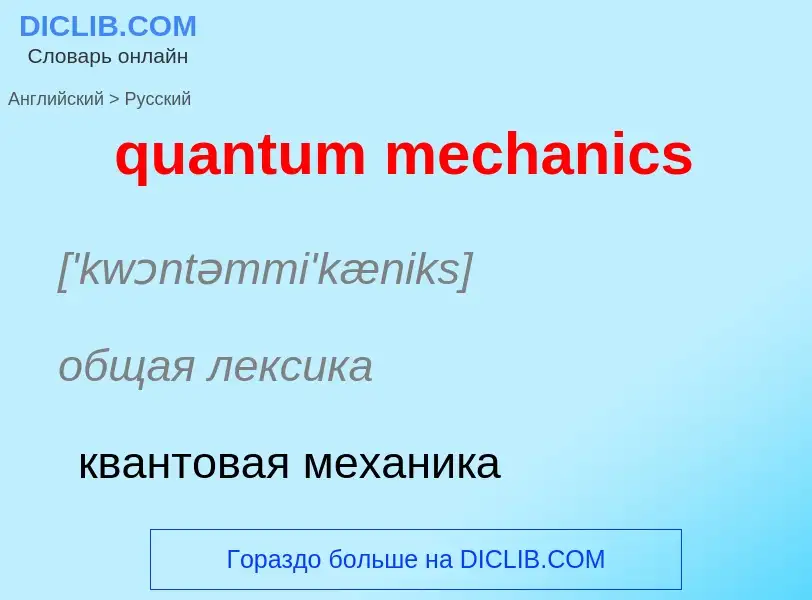Tradução e análise de palavras por inteligência artificial ChatGPT
Nesta página você pode obter uma análise detalhada de uma palavra ou frase, produzida usando a melhor tecnologia de inteligência artificial até o momento:
- como a palavra é usada
- frequência de uso
- é usado com mais frequência na fala oral ou escrita
- opções de tradução de palavras
- exemplos de uso (várias frases com tradução)
- etimologia
quantum mechanics - tradução para russo
['kwɔntəmmi'kæniks]
общая лексика
квантовая механика
общая лексика
квантовомеханический
общая лексика
квантовая физика
Definição
Wikipédia

Quantum mechanics is a fundamental theory in physics that provides a description of the physical properties of nature at the scale of atoms and subatomic particles.: 1.1 It is the foundation of all quantum physics including quantum chemistry, quantum field theory, quantum technology, and quantum information science.
Classical physics, the collection of theories that existed before the advent of quantum mechanics, describes many aspects of nature at an ordinary (macroscopic) scale, but is not sufficient for describing them at small (atomic and subatomic) scales. Most theories in classical physics can be derived from quantum mechanics as an approximation valid at large (macroscopic) scale.
Quantum mechanics differs from classical physics in that energy, momentum, angular momentum, and other quantities of a bound system are restricted to discrete values (quantization); objects have characteristics of both particles and waves (wave–particle duality); and there are limits to how accurately the value of a physical quantity can be predicted prior to its measurement, given a complete set of initial conditions (the uncertainty principle).
Quantum mechanics arose gradually from theories to explain observations that could not be reconciled with classical physics, such as Max Planck's solution in 1900 to the black-body radiation problem, and the correspondence between energy and frequency in Albert Einstein's 1905 paper, which explained the photoelectric effect. These early attempts to understand microscopic phenomena, now known as the "old quantum theory", led to the full development of quantum mechanics in the mid-1920s by Niels Bohr, Erwin Schrödinger, Werner Heisenberg, Max Born, Paul Dirac and others. The modern theory is formulated in various specially developed mathematical formalisms. In one of them, a mathematical entity called the wave function provides information, in the form of probability amplitudes, about what measurements of a particle's energy, momentum, and other physical properties may yield.


![resonant frequencies]] in acoustics.) resonant frequencies]] in acoustics.)](https://commons.wikimedia.org/wiki/Special:FilePath/Atomic-orbital-clouds spd m0.png?width=200)
![Position space probability density of a Gaussian [[wave packet]] moving in one dimension in free space Position space probability density of a Gaussian [[wave packet]] moving in one dimension in free space](https://commons.wikimedia.org/wiki/Special:FilePath/Guassian Dispersion.gif?width=200)
![[[Max Planck]] is considered the father of the quantum theory. [[Max Planck]] is considered the father of the quantum theory.](https://commons.wikimedia.org/wiki/Special:FilePath/Max Planck (1858-1947).jpg?width=200)
![spring]]) in [[classical mechanics]] (A-B) and quantum mechanics (C-H). In quantum mechanics, the position of the ball is represented by a [[wave]] (called the [[wave function]]), with the [[real part]] shown in blue and the [[imaginary part]] shown in red. Some of the trajectories (such as C, D, E, and F) are [[standing wave]]s (or "[[stationary state]]s"). Each standing-wave frequency is proportional to a possible [[energy level]] of the oscillator. This "energy quantization" does not occur in classical physics, where the oscillator can have ''any'' energy. spring]]) in [[classical mechanics]] (A-B) and quantum mechanics (C-H). In quantum mechanics, the position of the ball is represented by a [[wave]] (called the [[wave function]]), with the [[real part]] shown in blue and the [[imaginary part]] shown in red. Some of the trajectories (such as C, D, E, and F) are [[standing wave]]s (or "[[stationary state]]s"). Each standing-wave frequency is proportional to a possible [[energy level]] of the oscillator. This "energy quantization" does not occur in classical physics, where the oscillator can have ''any'' energy.](https://commons.wikimedia.org/wiki/Special:FilePath/QuantumHarmonicOscillatorAnimation.gif?width=200)
![The 1927 [[Solvay Conference]] in [[Brussels]] was the fifth world physics conference. The 1927 [[Solvay Conference]] in [[Brussels]] was the fifth world physics conference.](https://commons.wikimedia.org/wiki/Special:FilePath/Solvay conference 1927.jpg?width=200)
